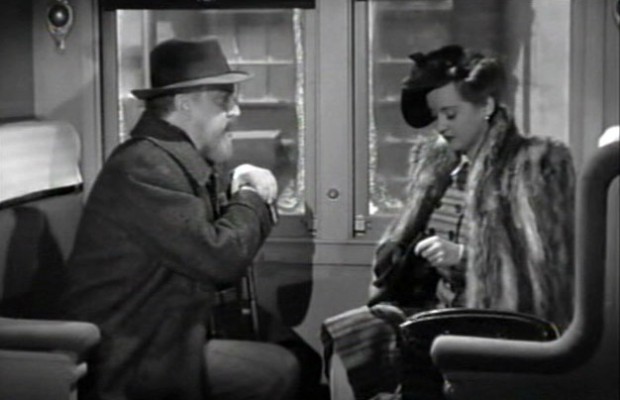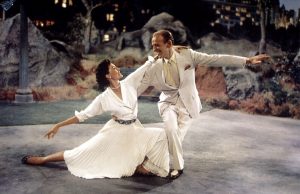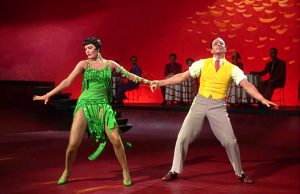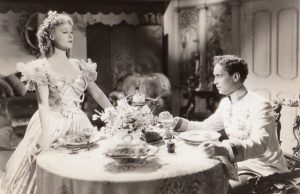The Man Who Came To Dinner (1941)
By Toronto Film Society on January 14, 2016
Toronto Film Society presented The Man Who Came To Dinner (1941) on Monday, January 9, 1978 in a double bill with Primrose Path as part of the Season 30 Monday Evening Film Buff Series, Programme 5.
Production Company: Warner Brothers. Producer: Hal B. Wallis, in association with Jerry Wald, Sam Harris and Jack Saper. Director: William Keighley. Screenplay: Julius J. and Philip G. Epstein, baed on the play of the same name by George S. Kaufman and Moss Hart. Photography: Tony Gaudio. Musical Score: Frederick Hollander. Musical Direction: Leo F. Forbstein. Gowns: Orry-Kelly. Art Direction: Robert Haas. Editor: Jack Killifer.
Cast: Bette Davis (Maggie Cutler), Monty Woolley (Sheridan Whiteside), Ann Sheridan (Lorraine Sheldon), Reginald Gardiner (Beverley Carleton), Jimmy Durante (Banjo), Grant Mitchell (Ernest Stanley), Billie Burke (Mrs. Stanley), George Barbier (Dr. Bradley), Mary Wickes (Miss Preen), Richard Travis (Bert Jefferson), Elizabeth Fraser, Russell Arms (the Stanley children), Ruth Vivian (Harriet), Edwin Stanley, Charles Drake, Nanette Vallon, John Ridgely.
A profusion of stage comedies were adapted for the screen throughout the 1930s and into the 40s. One of the best, released early in 1942, was tonight’s film. Even today, The Man Who Came To Dinner shines as brightly as ever. Wisely, to screen this broad and hilarious lampoon of the irascible, gushily sentimental “Town Crier”, Alexander Woollcott, the studio cast the stage’s original Sheridan Whiteside, Monty Wolley. As the world-renowned writer and raconteur spewing forth invective as he takes charge of an Ohio household, Woolley is perfect. (He had appeared in small roles since 1937, most notably as the judge in Midnight). By and large, the film follows the outlines of the play: Whiteside, confined to a wheelchair after slipping on the icy steps of his hosts’ home is carried inside shouting threats of a lawsuit. Cowed by his threats, the host, Mr. Stanley, and his social-climbing wife, do everything possible to make their injured guest comfortable. Resigned to being an unwanted guest, Whiteside decides to amuse himself by rearranging everyone’s life, bedevilling the Stanleys while cavorting with the famous friends who come to call.
Most of the film’s humour stems from Whiteside’s poisonous wit, and from the irrepressible antics of his friends. He reserves his most scurrilous remarks for his hapless nurse, Miss Preen (a memorable performance by Mary Wickes). Calling her “Miss Bedpan”, he casts aspersions on her love life, her professional ability, and her appearance. When she tries to keep him from eating candy, he remarks “My great-aunt Jennifer ate a whole box of candy every day of her life. She lived to be a hundred and two, and when she had been dead three days, she looked better than you do now!” (Small wonder that Miss Bedpan leaves her patient to work in a munitions factory.
Whiteside’s friends are clearly modeled after prominent theatrical figures. Ann Sheridan, only beginning to emerge from nondescript parts, is in fine strident form as a predatory, self-dramatizing actress, Lorraine Sheldon, reputedly resembling Gertrude Lawrence. Reginald Gardiner is very British and sophisticated in the manner of Noel Coward. The character of Banjo, played by Jimmy Durante, is obviously patterned after Harpo Marx and, except for Whiteside, is the film’s funniest personality.
Smartly directed by William Keighley, the film earned Bosley Crowther’s accolade as “unquestionably the most vicious but hilarious cat-clawing exhibition ever put on the screen, a deliciously wicked character portrait and a helter-skelter satire, withal”. He thought Bette Davis should be handed a palm “for accepting the secondary role of the secretary” and that she deserved another one “for playing it so moderately and well”. Still, the film belongs to Monty Woolley, amusingly vitriolic at every turn.
Apparently, Bette Davis while on holiday in New York had attended the play and felt the part of Maggie Cutler, the patient secretary to viperish author-lecturer Whiteside, would be an excellent change of pace from her recent dramatic roles in The Letter, The Great Lie and The Little Foxes. She suggested to J.L. Warner that the studio purchase the property for John Barrymore and herself, which was done. However, Barrymore was tested for Whiteside but had difficulties with the lines, which he read from cue cards paced outside of camera range. Apparently, his adlibbing was unacceptable with the result that Monty Woolley, who ha created the part, was brought out from New York for the picture. Bette Davis was not happy with the film and felt it was not directed in a very imaginative way. She was, of course, pleased with its success and admits her feelings about the picture probably stem from her disappointment in not working with the great John Barrymore.
Notes written and compiled by Barry Chapman
Sources: Lunatics and Lovers by Ted Sennett, 1973, Arlington House, Warner Brothers Presents by Ted Sennett, 1971, Castle Books, Mother Goddam by Whitney Stine with Bette Davis, 1974, Hawthorn Books Inc.
You may also like...
-
News

Frances Blau
Toronto Film Society | February 27, 2024On Monday, February 26th, 2024, Toronto Film Society lost longtime friend, supporter, and board member Frances Blau. Known for her sense of humour, her love of film, her generosity,...
-
Special Events

Arsenic and Old Lace (1944) at the Paradise Theatre
Toronto Film Society | April 21, 2024Toronto Film Society presents Arsenic and Old Lace (1944) at the Paradise Theatre on Sunday, May 5, 2024 at 2:30 p.m. Screwball comedy meets the macabre in one of...
Programming

Virtual Saturday Night at the Movies
Toronto Film Society | April 11, 2024Toronto Film Society is back in the theatre! However, we’re still pleased to continue to bring you films straight to your home! Beginning Season 73 until now we have...
4-
 Toronto Film Society | April 21, 2024
Toronto Film Society | April 21, 2024
-
 Toronto Film Society | November 6, 2022
Toronto Film Society | November 6, 2022
-
 Toronto Film Society | August 1, 2023
Toronto Film Society | August 1, 2023
Donate to Toronto Film Society – We’re now a Registered Charity!
-
Copyright © 2017 Toronto Film Society.






Leave a Reply